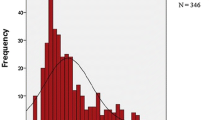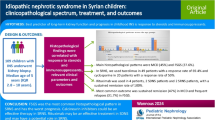Abstract
Background
Little is known regarding the epidemiology of idiopathic nephrotic syndrome (INS) in East Asia. Previous studies have suggested higher incidence of INS in Asian children, though decreasing trend of its incidence has also been shown.
Methods
We conducted a nationwide study of Japanese children aged 6 months to 15 years with INS. Children who were newly diagnosed with INS between 1 January 2010 and 31 December 2012 were eligible. Children with congenital nephrotic syndrome or nephrotic syndrome secondary to nephritis were excluded.
Results
A total of 2099 children were initially diagnosed with INS and were followed for up to 4 years. The estimated incidence of INS was 6.49 cases/100,000 children per year, without clear correlation with geographical region. The male:female ratio was 1.9 and approximately 50 % of children were <5 years old at diagnosis. During the 1–4 years follow-up, 32.7 % developed frequently relapsing nephrotic syndrome and steroid-dependent nephrotic syndrome.
Conclusions
Based on our nationwide survey, the incidence of INS in Japanese children is approximately 3–4 times higher than that in Caucasians. However, the male:female ratio and the age at onset were similar to those in previous studies. We are now planning a prospective cohort study to examine the course of INS in Japan.


Similar content being viewed by others
References
Eddy AA, Symons JM. Nephrotic syndrome in childhood. Lancet. 2003;362:629–39.
van Husen M, Kemper MJ. New therapies in steroid-sensitive and steroid-resistant idiopathic nephrotic syndrome. Pediatr Nephrol. 2011;26:881–92.
Kengne-Wafo S, Massella L, Diomedi-Camassei F, Gianviti A, Vivarelli M, Greco M, Stringini GR, Emma F. Risk factors for cyclosporin A nephrotoxicity in children with steroid-dependant nephrotic syndrome. Clin J Am Soc Nephrol. 2009;4:1409–16.
Pravitsitthikul N, Willis NS, Hodson EM, Craig JC. Non-corticosteroid immunosuppressive medications for steroid-sensitive nephrotic syndrome in children. Cochrane Database Syst Rev. 2013;10:CD002290.
Warady BA, Chadha V. Chronic kidney disease in children: the global perspective. Pediatr Nephrol. 2007;22:1999–2009.
Harambat J, van Stralen KJ, Kim JJ, Tizard EJ. Epidemiology of chronic kidney disease in children. Pediatr Nephrol. 2012;27:363–73.
Wong W. Idiopathic nephrotic syndrome in New Zealand children, demographic, clinical features, initial management and outcome after twelve-month follow-up: results of a three-year national surveillance study. J Paediatr Child Health. 2007;43:337–41.
El Bakkali L, Rodrigues Pereira R, Kuik DJ, Ket JC, van Wijk JA. Nephrotic syndrome in The Netherlands: a population-based cohort study and a review of the literature. Pediatr Nephrol. 2011;26:1241–6.
Chang JW, Tsai HL, Yang LY, Chen TJ. Epidemiology and predictors of end-stage renal disease in Taiwanese children with idiopathic nephrotic syndrome. J Epidemiol. 2012;22:517–22.
Ernould S, Godron A, Nelson JR, Rigothier C, Llanas B, Harambat J. Idiopathic nephrotic syndrome in children: incidence, clinical presentation, and outcome in the county of Gironde, France. Arch Pediatr. 2011;18:522–8 (in French).
Feehally J, Kendell NP, Swift PG, Walls J. High incidence of minimal change nephrotic syndrome in Asians. Arch Dis Child. 1985;60:1018–20.
McKinney PA, Feltbower RG, Brocklebank JT, Fitzpatrick MM. Time trends and ethnic patterns of childhood nephrotic syndrome in Yorkshire, UK. Pediatr Nephrol. 2001;16:1040–4.
Sharples PM, Poulton J, White RH. Steroid responsive nephrotic syndrome is more common in Asians. Arch Dis Child. 1985;60:1014–7.
Ishikura K, Matsumoto S, Sako M, Tsuruga K, Nakanishi K, Kamei K, Saito H, Fujinaga S, Hamasaki Y, Chikamoto H, Ohtsuka Y, Komatsu Y, Ohta T, Nagai T, Kaito H, Kondo S, Ikezumi Y, Tanaka S, Kaku Y, Iijima K. Clinical practice guideline for pediatric idiopathic nephrotic syndrome 2013: medical therapy. Clin Exp Nephrol. 2015;19:6–33.
Kaku Y, Ohtsuka Y, Komatsu Y, Ohta T, Nagai T, Kaito H, Kondo S, Ikezumi Y, Tanaka S, Matsumoto S, Sako M, Tsuruga K, Nakanishi K, Kamei K, Saito H, Fujinaga S, Hamasaki Y, Chikamoto H, Ishikura K, Iijima K. Clinical practice guideline for pediatric idiopathic nephrotic syndrome 2013: general therapy. Clin Exp Nephrol. 2015;19:34–53.
Hashimoto S, Fukutomi K, Nagai M, Nakamura Y, Yanagawa H, Sasaki R, Ohno Y. A note on methods for estimating the number of patients in the nationwide epidemiological survey on intractable diseases. Nihon Koshu Eisei Zasshi. 1990;37:768–74 (in Japanese).
Srivastava T, Simon SD, Alon US. High incidence of focal segmental glomerulosclerosis in nephrotic syndrome of childhood. Pediatr Nephrol. 1999;13:13–8.
Zaki M, Helin I, Manandhar DS, Hunt MC, Khalil AF. Primary nephrotic syndrome in Arab children in Kuwait. Pediatr Nephrol. 1989;3:218–20 (discussion 221).
Jin DK, Kohsaka T, Tanaka M, Abe J, Kobayashi N. Human leukocyte antigens in childhood idiopathic nephrotic syndrome. Acta Paediatr Jpn. 1991;33:709–13.
Yoshikawa N, Nakanishi K, Sako M, Oba MS, Mori R, Ota E, Ishikura K, Hataya H, Honda M, Ito S, Shima Y, Kaito H, Nozu K, Nakamura H, Igarashi T, Ohashi Y, Iijima K. A multicenter randomized trial indicates initial prednisolone treatment for childhood nephrotic syndrome for 2 months is not inferior to six-month treatment. Kidney Int. 2015;87:225–32.
Nakanishi K, Iijima K, Ishikura K, Hataya H, Nakazato H, Sasaki S, Honda M, Yoshikawa N. Two-year outcome of the ISKDC regimen and frequent-relapsing risk in children with idiopathic nephrotic syndrome. Clin J Am Soc Nephrol. 2013;8:756–62.
Sinha A, Saha A, Kumar M, Sharma S, Afzal K, Mehta A, Kalaivani M, Hari P, Bagga A. Extending initial prednisolone treatment in a randomized control trial from 3 to 6 months did not significantly influence the course of illness in children with steroid-sensitive nephrotic syndrome. Kidney Int. 2015;87:217–24.
Tarshish P, Tobin JN, Bernstein J, Edelmann CM Jr. Prognostic significance of the early course of minimal change nephrotic syndrome: report of the International Study of Kidney Disease in Children. J Am Soc Nephrol. 1997;8:769–76.
Fakhouri F, Bocquet N, Taupin P, Presne C, Gagnadoux MF, Landais P, Lesavre P, Chauveau D, Knebelmann B, Broyer M, Grunfeld JP, Niaudet P. Steroid-sensitive nephrotic syndrome: from childhood to adulthood. Am J Kidney Dis. 2003;41:550–7.
Ruth EM, Kemper MJ, Leumann EP, Laube GF, Neuhaus TJ. Children with steroid-sensitive nephrotic syndrome come of age: long-term outcome. J Pediatr. 2005;147:202–7.
Ishikura K, Yoshikawa N, Nakazato H, Sasaki S, Nakanishi K, Matsuyama T, Ito S, Hamasaki Y, Yata N, Ando T, Iijima K, Honda M. Morbidity in children with frequently relapsing nephrosis: 10-year follow-up of a randomized controlled trial. Pediatr Nephrol. 2015;30:459–68.
Hamasaki Y, Yoshikawa N, Nakazato H, Sasaki S, Iijima K, Nakanishi K, Matsuyama T, Ishikura K, Ito S, Kaneko T, Honda M. Prospective 5-year follow-up of cyclosporine treatment in children with steroid-resistant nephrosis. Pediatr Nephrol. 2013;28:765–71.
Dossier C, Sellier-Leclerc AL, Rousseau A, Michel Y, Gautheret-Dejean A, Englender M, Madhi F, Charbit M, Ulinski T, Simon T, Jacqz-Aigrain E, Deschenes G. Prevalence of herpesviruses at onset of idiopathic nephrotic syndrome. Pediatr Nephrol. 2014;29:2325–31.
Acknowledgments
Information on all hospitals, institutions, and pediatricians was extracted from the “Medical database” supported by Nihon Ultmarc Inc. We thank Nicholas Smith, PhD, of Edanz Group Ltd., for providing language editorial support in the preparation of the manuscript. We also thank everyone who contributed data to this study, including all of the anonymous participants.
Author information
Authors and Affiliations
Consortia
Corresponding author
Ethics declarations
Financial disclosure
This study was supported by Asahi Kasei Pharma Corporation, Astellas Pharma, Fuso Pharmaceutical Industries, Ltd, JMS Co., Ltd., Novartis Pharma K.K., and Zenyaku Kogyo Co., Ltd.
Conflict of interest
Norishige Yoshikawa has received research funding from Novartis Pharma K.K. and Asahi Kasei Pharma Corporation. Kazumoto Iijima has received research funding from Daiichi Sankyo, Co., Ltd., Clio, Co., Ltd., Sysmex Corporation, and manuscript fees from Chugai Pharmaceutical Co., Ltd. Yuko Hamasaki belongs to an endowed department sponsored by Asahi Kasei Pharma Corporation, Novartis Pharma K.K., Chugai Pharmaceutical Co., and Astellas Pharma.
Ethics
The present study was conducted in accordance with the ethical principles set out in the Declarations of Helsinki, and with the ethical guidelines for epidemiological studies issued by the Ministry of Health, Labour and Welfare in Japan. The study was approved by a central ethics board (National Center for Child Health and Development; approval number 702) before commencing the study. Because all data were reported in a retrospective manner using patient charts, informed consent was not obtained in accordance with the above guidelines.
Electronic supplementary material
Below is the link to the electronic supplementary material.
About this article
Cite this article
Kikunaga, K., Ishikura, K., Terano, C. et al. High incidence of idiopathic nephrotic syndrome in East Asian children: a nationwide survey in Japan (JP-SHINE study). Clin Exp Nephrol 21, 651–657 (2017). https://doi.org/10.1007/s10157-016-1319-z
Received:
Accepted:
Published:
Issue Date:
DOI: https://doi.org/10.1007/s10157-016-1319-z




